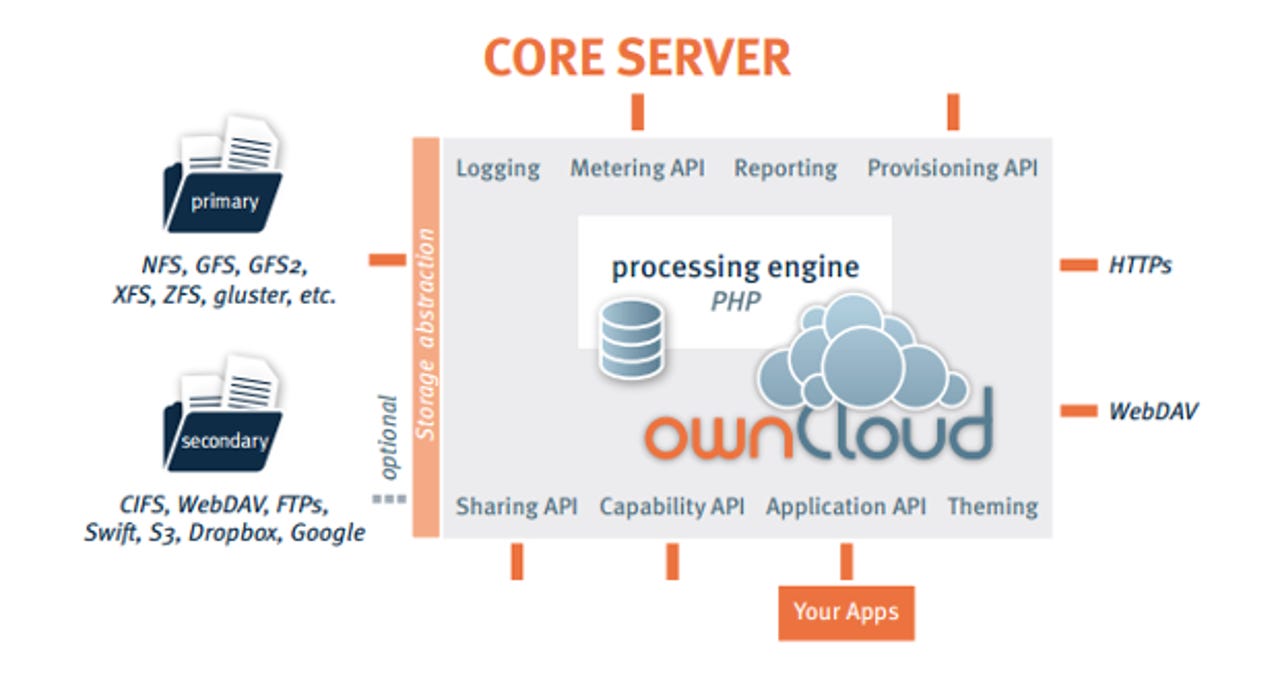Open-source IaaS: OwnCloud 7 Enterprise Edition arrives

If your office is like mine, you already have a lot of storage. Over the years, it's probably become quite a mix of storage-area networks (SAN), network-attached storage (NAS), and servers. More recently, your staff has started to use tablets, smartphones, and chromebooks instead of PCs for work. A cloud would make sharing your files with your mobile staff much easier. So, what's a CIO to do?

Dump all your old gear and move to a new cloud-based storage system? I don't think so!
One possible good alternative to making the most of your existing storage infrastructure while providing a cloud-friendly, bring-your-own-device (BYOD) approach is the new ownCloud 7 Enterprise Edition.
This open-source infrastructure as a service (IaaS) enables you to access, control, and manage files across corporate data silos. You and your system administrators get to choose which servers you'll own for your private ownCloud. With it, you can control how your users access files across on-site storage devices and private/hybrid cloud storage services. For example, your IT admins can quickly integrate ownCloud with your existing Active Directory (AD) and/or Lightweight Directory Access Protocol (LDAP).
At the same time, your users can easily access your data stores from smartphones, tablets, and PCs as if these were a single unified storage device. At the same time, with ownCloud's Server-to-Server Sharing capabilities, users on one ownCloud installation can seamlessly share files with users on a different ownCloud installation without using shared links. Thus, you can retain the privacy and control of your own private ownCloud, while gaining the flexibility and ease of use of public cloud file sharing.
"Every organization has an issue with data sprawl, and mobility just makes it worse," said Terri McClure, senior analyst at Enterprise Strategy Group. OwnCloud's "special sauce is giving employees access to all their data from a single point, no matter what device they use, to avoid even more redundancy and still keep IT in control."
OwnCloud does this with its new Universal File Access. This provides a common file access layer across an organization, whether the data resides on internal servers, on object storage, in applications like SharePoint or Jive, other ownClouds, or even external cloud systems such as Dropbox, Google, and Amazon. In the public cloud cases, the files are synced to desktops or mobile apps to make them available offline.
In addition, with this latest version, users can now access and sync all of their SharePoint 2007, 2010, and 2013 content via ownCloud. The system administrator can also add SharePoint document libraries individually as needed to provide users with anytime, anywhere access to file while respecting the existing Access Control Lists (ACLs) controls.
Windows network drive integration has also been improved. The company claims that it's easier "than ever for the administrator to mount Windows network drives for a user, a group or the entire ownCloud instance. If an organization has one or many network drives, these can be added by the admin and applied to the instance. Users can then access all network drives in a single folder hierarchy, and all of their native ACLs are respected."
Finally, object stores — such as Swift, the OpenStack Object Storage, and Amazon S3 — can now be used as primary storage. The administrators can mix and match all these various forms of storage to best fit their users' needs.
"Organizations have spent years building complex, heterogeneous IT environments to support their business processes," said Markus Rex, ownCloud's CEO in a press release. "And now, with the introduction of public clouds and consumer-grade file sync and share apps, it just gets more complex — a real unstructured data mess adding complexity and cost, as well as the potential for serious security and privacy disasters. OwnCloud offers IT the ability to give employees quick and easy access to their files — no matter where they reside — and provides a data management layer allowing IT to maintain complete policy-based control and integrating with the tools and processes they already have."
OwnCloud 7 Enterprise Edition is available now. Pricing for ownCloud Enterprise Edition begins at a yearly subscription of $9,000 for 50 users.
Sound too good to be true? OwnCloud is available for a 30-day free trial as an easy-to-install-and-configure virtual appliance for vSphere, VMware Workstation, or Linux KVM. You can also download and use the ownCloud 7 Community Edition.
Related stories: